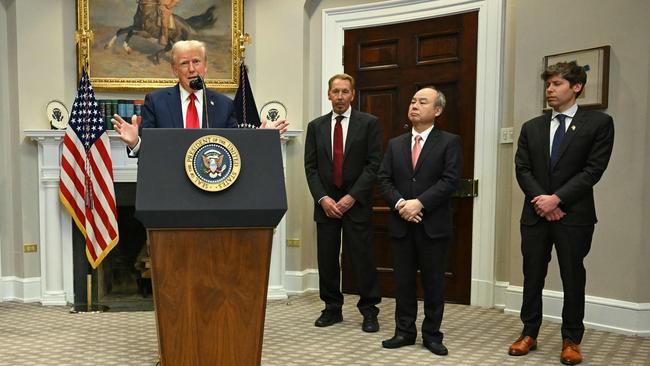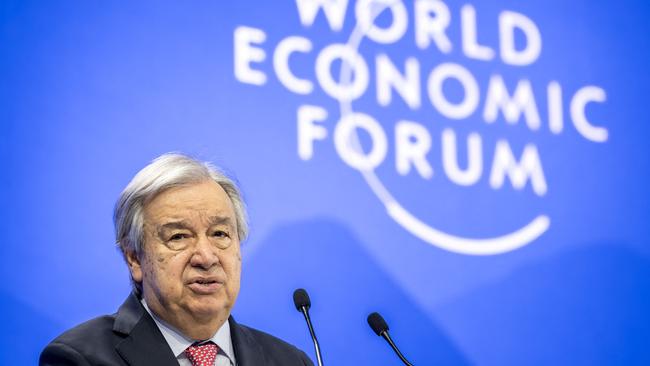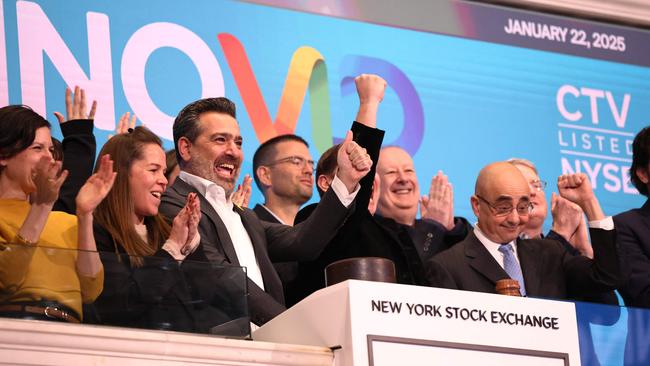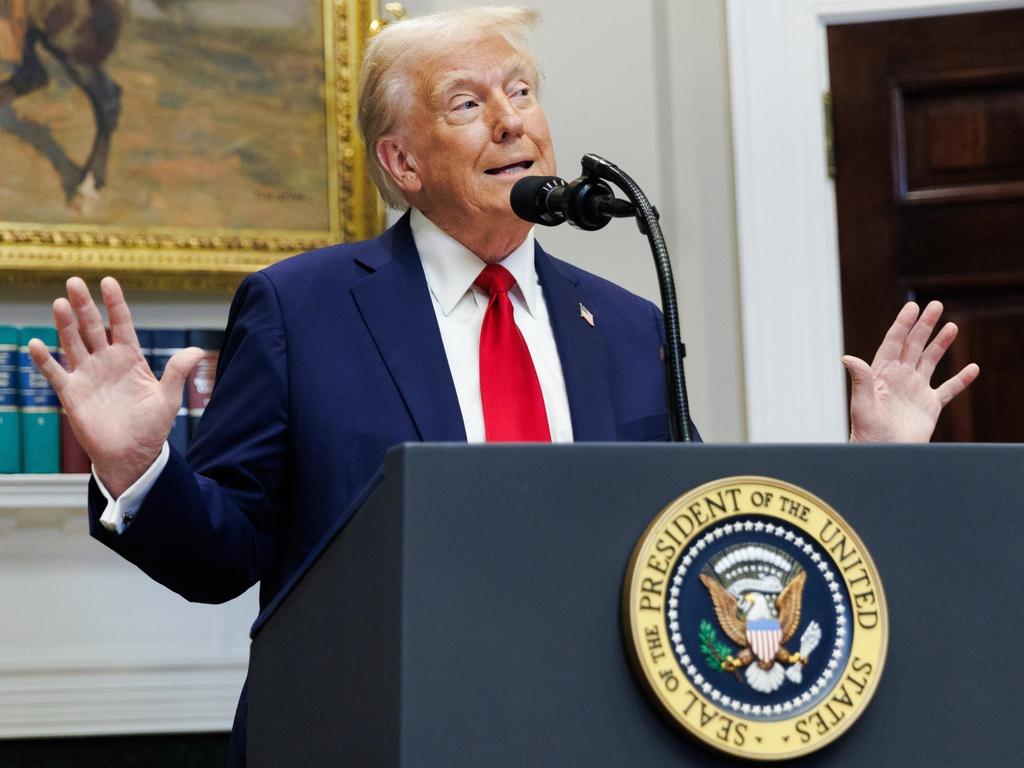Trump’s arrival brightens US outlook, darkens everyone else’s
Traditionally, a strong US economy lifts all boats by helping other countries’ exports. But with the US President threatening to turn the tables with tariffs, all bets are off.
Usually, what’s good for the US economy is good for the world. Not this year.
When participants at the World Economic Forum look at President Donald Trump’s plans, they become more optimistic about the US and more pessimistic about the rest of the world, especially Europe.
The US was outperforming much of the world before Mr Trump was elected. His agenda could extend that outperformance by making the US the preferred destination for foreign investment via lower taxes and regulation and even cheaper energy, while his promised tariffs hurt others’ exports.
The zeitgeist is embodied by the investment bankers flooding Davos who, in their own version of speed dating, rush from one client meeting to another, late into the night over expensive wine and artisanal cocktails.
Bankers are betting the Trump administration heralds a new wave of megamergers that wasn’t feasible under former president’s Joe Biden’s harsh scrutiny around antitrust. But a European banker said the tone outside the US is “really depressing,” particularly in Europe, where deal activity is subdued.

Indeed, some predict that US companies, sporting far higher stock valuations, will soon be snapping up European rivals.
Traditionally, a strong US economy lifted all boats by helping other countries’ exports. But Mr Trump has seen that dynamic as other countries are taking advantage of the US, and now seeks to turn the tables.
The “driving philosophy and mindset of the incoming administration” is a “zero-sum game strategy,” said Tim Adams, president of the Institute of International Finance.
People at Davos who broke away from meetings and parties to follow the new President’s flurry of executive orders were relieved that, for now, tariffs weren’t included.
Still, the prospect of tariffs hangs over US trading partners, especially Mexico, China and Canada, all singled out by Mr Trump.

The breadth of his tariff threats has all countries concerned. Mr Trump’s first term benefited Malaysia because it was the recipient of investment being shifted away from China, said Tengku Zafrul Aziz, that country’s minister of investment, trade and industry.
While “we do not want to jump the gun” on what Mr Trump does in his second term, “from what we read,” it would be less beneficial than the first, he said.
If tariffs on China hurt its exports of electronic products, that would reduce Malaysian exports to China of components that go into such products, he said.
Klaas Knot, president of the Netherlands’ central bank, predicted tariffs’ impact on Europe will subtract just “a few tenths of a percentage point” from economic growth, with the impact diluted by redirection of trade flows and the lower euro.
“The only reason why a few tenths is significant is that unfortunately the starting level [of eurozone growth] is relatively low” – projected at around 1pc this year, he said.
One European official worried less about tariffs than the potential loss of investment to the US as energy, already much cheaper than in Europe, becomes even more so under Mr Trump.
“The Biden administration was very ambivalent” about US oil and gas prowess, said energy expert Daniel Yergin, vice chairman of S&P Global.
“This administration has no inhibitions about that. It sees the US’s status as the largest producer of oil and gas as a strategic advantage.”

Many at Davos blamed Europe’s dismal outlook on the failures of its own leaders, not on Mr Trump.
European scientists are making progress on technologies that use genetically engineered microbes to solve any number of problems, said Kasim Kutay, the chief executive of Novo Holdings, which manages the assets and wealth of the foundation that controls Danish pharmaceutical company Novo Nordisk.
It takes seven to eight years, however, to get such a product approved by European regulators, compared with two to three in the US, he said: “A lot of that innovation is happening in Europe, but the companies ultimately seek funding in the US.”
One particular source of anxiety in Europe is that its top companies will move to the US in search of higher stock valuations, less regulation and kinder treatment by Mr Trump.
Rich Nuzum, global chief investment strategist for investment consultants Mercer, said Mr Trump’s deregulatory drive might jolt Europe into action.
“If the US economy continues to power ahead, if every company wants to be headquartered in the US and traded in the US because of a lighter regulatory burden ... European C-suites will say to European policymakers, ‘Do something, or we’re going to move overseas’.”
The US accounted for 44pc of Swedish telecom equipment giant Ericsson’s net sales in the third quarter of 2024, up from 31pc a year earlier. Chief executive Börje Ekholm has criticized excessive regulation for discouraging the upgrading of Europe’s networks.
Asked if Ericsson would move its head office to the US, Mr Ekholm said, “We are Swedish based. But I think every company in Europe will need to think about this going forward.” Like Europe, China faces headwinds; tariffs would be just one more. China’s problem “is not Trump,” said Keyu Jin, a British-based economist specialising in the Chinese economy.
“It’s the unemployment numbers. So many companies going under. So much debt the government owes to the private sector. The problems with young people. The ‘lying flat’ problem.”
She said Chinese authorities know the economy needs stimulus, but face a dilemma: “How do you stimulate in the right way” without a “debt explosion?”
The divergence between the US and other countries could create financial strains. Ralph Recto, secretary of finance of the Philippines, said high tariffs would tend to aggravate US inflation and keep interest rates higher. That would weaken his country’s exchange rate and make it harder for the Philippines to lower interest rates, he said.
The US is at risk, too While Davos is bullish on the US economy, the feeling comes with warnings that Trump’s agenda contains potentially destabilizing contradictions.
For example, stronger growth and investment should elevate interest rates, drawing in foreign capital, boosting the dollar, and raising imports while hurting exports.
“Resisting the trade deficit and craving foreign capital is a logically inconsistent position,” said former Treasury Secretary Larry Summers.
Kenneth Rogoff, an economist and financial historian at Harvard University, said protectionism and populism tend to push inflation and interest rates higher. But populists such as Trump, rather than change their policies, might resort to controls on prices or the international flow of capital. He called such controls “a tail risk” for the US.
– Marie Beaudette, Lauren Thomas and James Mackintosh contributed to this article
– The Wall Street Journal





To join the conversation, please log in. Don't have an account? Register
Join the conversation, you are commenting as Logout